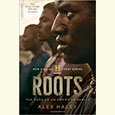A Literary Reunion
The Celebration of Southern Literature brings many of the South’s finest writers to Chattanooga
The Fellowship of Southern Writers—a group that includes luminaries like Bobbie Ann Mason, Ron Rash, and Natasha Trethewey—will gather in Chattanooga April 16-18, 2015, for a unique literary event. The Celebration of Southern Literature is part writers’ conference, part book fair, and part homecoming for a diverse group of authors who share a connection to the region and its distinctive literary spirit. The CSL is open to the public, but it has a more intimate character than many such conferences. Attendees will have an opportunity to meet the writers, participate in sessions on craft, and listen to panel discussions and readings in the beautifully restored Tivoli Theater.
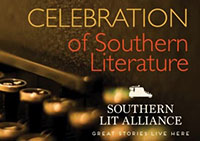 The history of today’s CSL dates back to 1981, when the Southern Lit Alliance (then called the Arts & Education Council) launched the Conference on Southern Literature, which drew a roster of distinguished writers that included Eudora Welty and Peter Taylor. A group of those writers, wishing to create a non-academic association devoted to encouraging and recognizing the literature of the South, formed the Fellowship of Southern Writers in 1987. The Fellowship was initiated with the understanding that it would work in collaboration with the Southern Lit Alliance to hold a biennial literary conference for the community, and that partnership has continued unchanged, although the conference was renamed the Celebration of Southern Literature in 2012.
The history of today’s CSL dates back to 1981, when the Southern Lit Alliance (then called the Arts & Education Council) launched the Conference on Southern Literature, which drew a roster of distinguished writers that included Eudora Welty and Peter Taylor. A group of those writers, wishing to create a non-academic association devoted to encouraging and recognizing the literature of the South, formed the Fellowship of Southern Writers in 1987. The Fellowship was initiated with the understanding that it would work in collaboration with the Southern Lit Alliance to hold a biennial literary conference for the community, and that partnership has continued unchanged, although the conference was renamed the Celebration of Southern Literature in 2012.
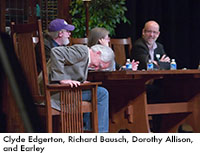 The Fellowship is limited to fifty members, and the invitation to join is based on literary achievement. The membership list is a who’s who of great Southern writers. Robert Penn Warren, Ralph Ellison, Shelby Foote, and William Styron were all members of the Fellowship, as are Wendell Berry, Lee Smith, and Allan Gurganus. Katori Hall, Ann Patchett, and Claudia Emerson have been among the more recent inductees. Becoming a Fellow is a significant honor, but the organization is as much about writerly camaraderie as artistic recognition. The gathering in Chattanooga is a social occasion for the writers, a reunion of sorts for a group of friends bound together by a common vocation and a shared desire to promote the literary life of the region. As FSW Chancellor Wyatt Prunty puts it, “In addition to recognition, becoming a member of the Fellowship also is just a great pleasure. There is no better company to be found.”
The Fellowship is limited to fifty members, and the invitation to join is based on literary achievement. The membership list is a who’s who of great Southern writers. Robert Penn Warren, Ralph Ellison, Shelby Foote, and William Styron were all members of the Fellowship, as are Wendell Berry, Lee Smith, and Allan Gurganus. Katori Hall, Ann Patchett, and Claudia Emerson have been among the more recent inductees. Becoming a Fellow is a significant honor, but the organization is as much about writerly camaraderie as artistic recognition. The gathering in Chattanooga is a social occasion for the writers, a reunion of sorts for a group of friends bound together by a common vocation and a shared desire to promote the literary life of the region. As FSW Chancellor Wyatt Prunty puts it, “In addition to recognition, becoming a member of the Fellowship also is just a great pleasure. There is no better company to be found.”
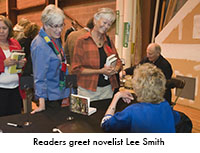 Poets Kate Daniels, Brooks Haxton, and C.D. Wright will be inducted into the Fellowship at this year’s conference, along with fiction writers George Singleton, Steve Yarbrough, and Tayari Jones. The newcomers tend to throw around words like “delighted” and “thrilled” when asked how they feel about becoming Fellows. Yarbrough describes it as “the greatest honor that’s ever come my way” and says he has wanted to belong to the Fellowship “since the day I first heard of it.” Singleton expresses his pleasure with characteristic wit. “I hail from a tribe of tricksters, so when I first received the news I thought, of course, that someone played a practical joke on me. And I still have my guard up—could it be some kind of intervention for a number of vices I either have or could form in the near future?”
Poets Kate Daniels, Brooks Haxton, and C.D. Wright will be inducted into the Fellowship at this year’s conference, along with fiction writers George Singleton, Steve Yarbrough, and Tayari Jones. The newcomers tend to throw around words like “delighted” and “thrilled” when asked how they feel about becoming Fellows. Yarbrough describes it as “the greatest honor that’s ever come my way” and says he has wanted to belong to the Fellowship “since the day I first heard of it.” Singleton expresses his pleasure with characteristic wit. “I hail from a tribe of tricksters, so when I first received the news I thought, of course, that someone played a practical joke on me. And I still have my guard up—could it be some kind of intervention for a number of vices I either have or could form in the near future?”
Writers often reflexively resist labels, especially in today’s publishing climate where originality is all, but the newest members of the Fellowship seem happy to embrace the “Southern writer” designation. Tayari Jones says she has no concerns about being pigeonholed or stigmatized by a regional label: “As an African-American writer, especially, it means a lot to say that this is home. This is mine. This is who I am. People died for me to feel at home at home.” Kate Daniels grew up in Virginia with an English mother who was dismissive of the South, and consequently she was slow to embrace the idea of herself as a Southerner: “Over the years, however, it has become a primary part of my identity,” she says. “So being ‘claimed’ by the FSW is really very meaningful to me.”
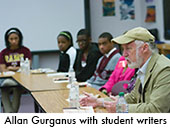 The culture and demographics of the South have changed significantly in the past thirty years and will continue to change, and while the FSW reveres the region’s literary past, it’s not invested in a fixed vision of the future. The group has never been committed to any particular literary aesthetic or ideology and makes no attempt to define what characterizes Southern literature beyond a simple regional association. “The Fellowship of Southern Writers will evolve as Southern writing evolves,” says Prunty. The only certainty, he says, is that “members of the Fellowship will be at the forefront of excellent letters, not only for the South but for the entire country.”
The culture and demographics of the South have changed significantly in the past thirty years and will continue to change, and while the FSW reveres the region’s literary past, it’s not invested in a fixed vision of the future. The group has never been committed to any particular literary aesthetic or ideology and makes no attempt to define what characterizes Southern literature beyond a simple regional association. “The Fellowship of Southern Writers will evolve as Southern writing evolves,” says Prunty. The only certainty, he says, is that “members of the Fellowship will be at the forefront of excellent letters, not only for the South but for the entire country.”
Jill McCorkle, Lee Smith, Roy Blount, Jr., Richard Bausch, and Jayne Anne Philips are just a few of the Fellows scheduled to appear at this year’s events. Poets Kevin Young and Terrance Hayes are among the non-Fellows who will be on hand to receive FSW awards. Admission to all three days of the Celebration’s panels, readings, and book signings is $50, and single-day passes are available for $25. Additional ticketed events include an evening reception, craft sessions led by Fellowship writers, a box lunch and tour of the Eudora Welty photography exhibit at the Hunter Museum, and a dinner with John T. Edge of the Southern Foodways Alliance. All tickets, as well as information on lodging and transportation, are available through the Southern Lit Alliance website, here.

Maria Browning is a fifth-generation Tennessean who grew up in Erin and Nashville. A graduate of Mount Holyoke College, she has attended the Clothesline School of Writing in Chicago, the Moss Workshop with Richard Bausch at the University of Memphis, and the Sewanee Writers’ Conference. She lives in White Bluff.
